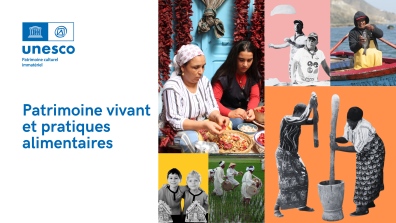ICHD - Notions and issues of intangible cultural heritage

The "Intangible Cultural Heritage" (ICH) defined by UNESCO in October 2003 recorded eating habits and culinary practices for the first time in 2010. France was the first to register its "gastronomic meal", followed by other countries such as Japan, Greece, Italy, Kenya, Senegal and, more recently, Peru and Lebanon. To date, 18 countries and 5 regions have had their culinary and food heritage registered with UNESCO.
The intangible cultural heritage, or living heritage, is at the heart of human communities. They are the ones who create it, keep it alive, pass it on and transform it. Like communities, living heritage is rich and diverse, evolving over time and adapting to context. Food practices are an integral part of the lifestyles of groups and communities, and this is reflected in increasing numbers of inscriptions on the Lists of the 2003 Convention for the Safeguarding of the Intangible Cultural Heritage, at the initiative of the States Parties.
This presentation will approach food heritage from the angle of the 2003 Convention, introducing its key concepts and principles. It will analyze how practices and knowledge associated with food are positioned today within the framework of the Convention's work and instruments, also addressing the actors who come into play to bring these practices to the fore, foremost among them, the holding communities.
Conference by Ana Gonzalez Medina, Program Specialist, Culture Sector, Living Heritage Entity at the UNESCO.